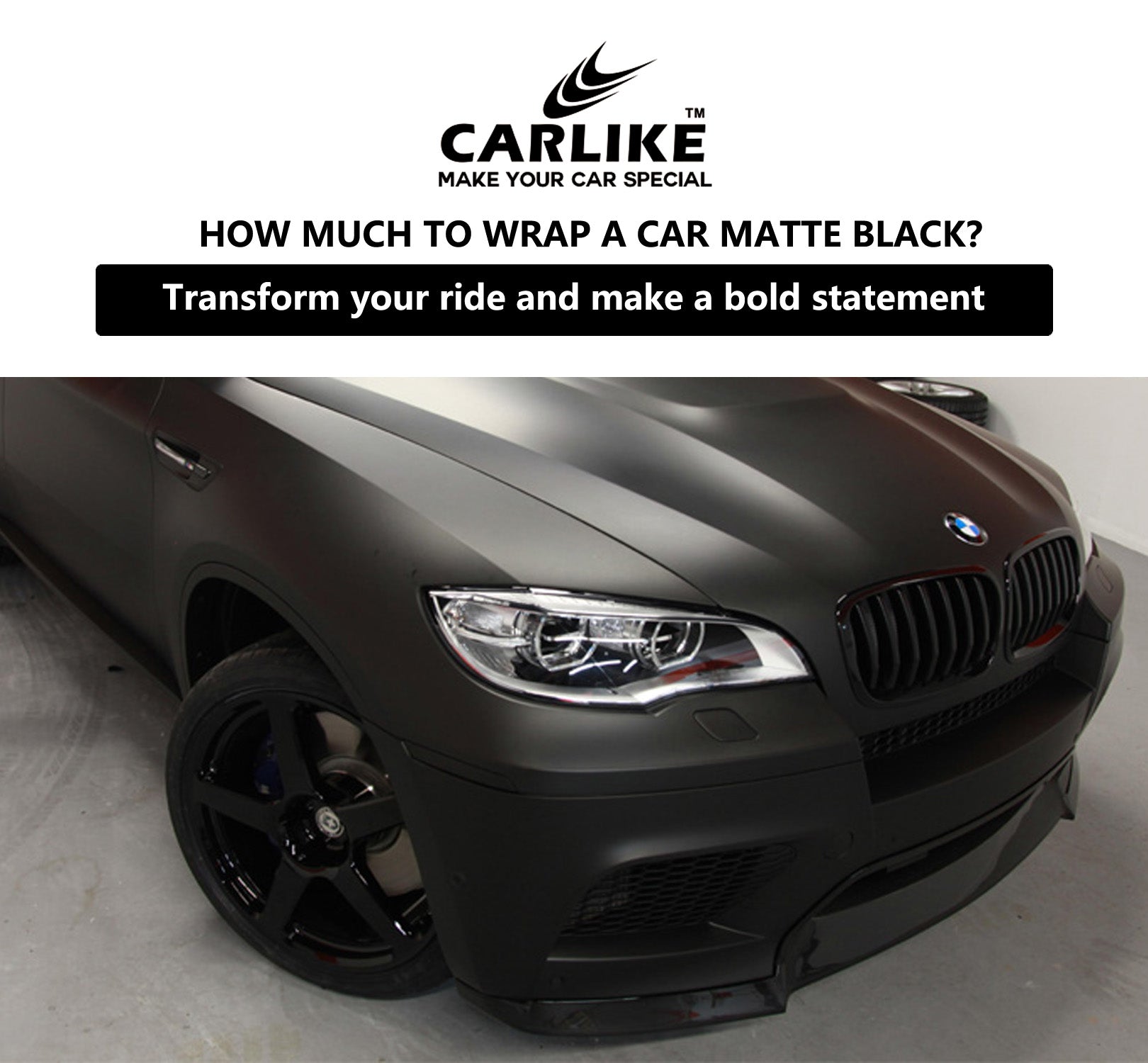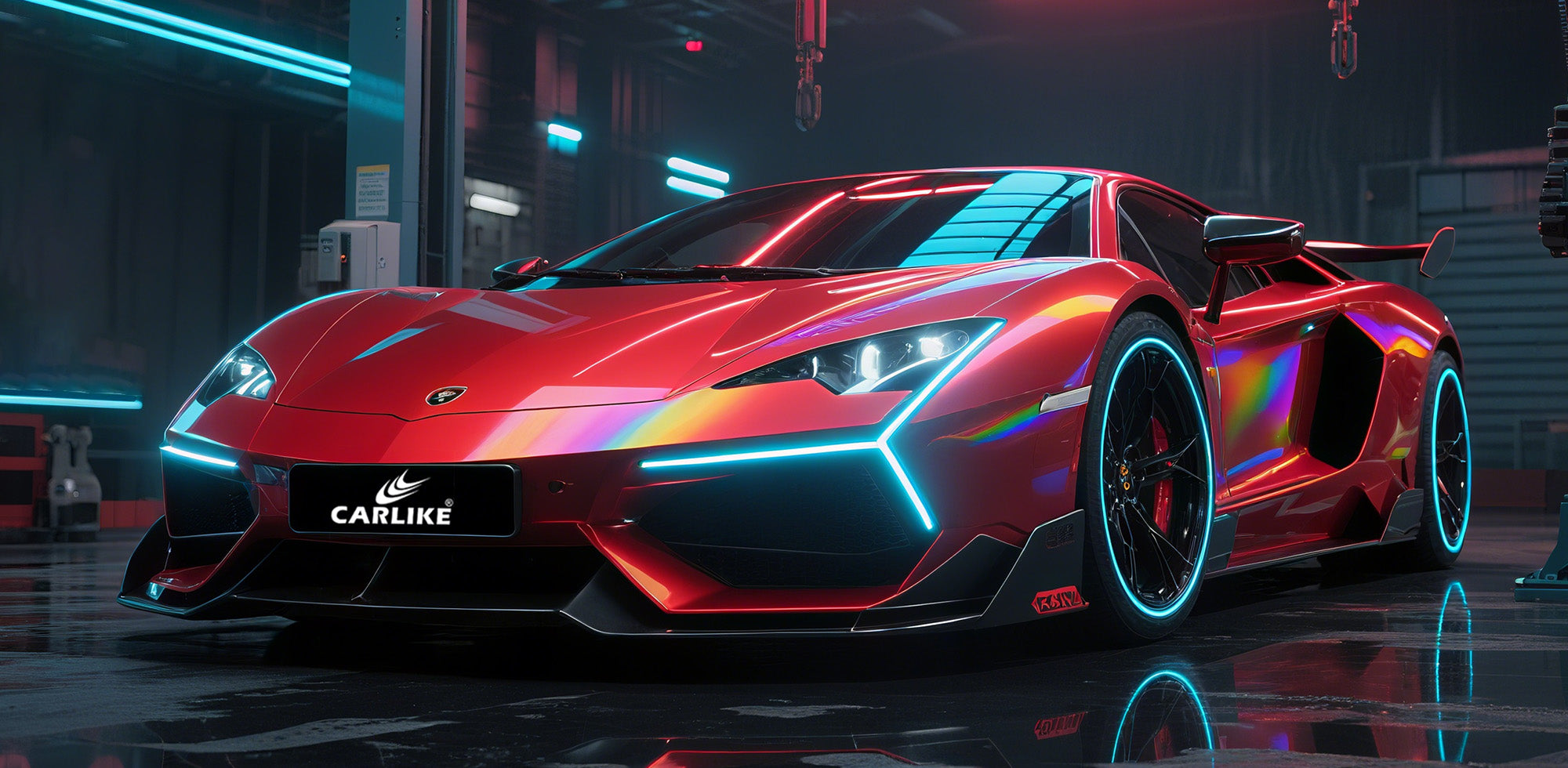
Understanding Car Vinyl Wraps: What They Are and How They Work
Car vinyl wrapping have emerged as a leading trend in the automotive world, presenting a captivating intersection of form and function. But what are they, how do they work, and why are they fast becoming a staple in car customization? This article delves into these questions, providing a comprehensive look at the intricacies of car vinyl wraps.
What Are Car Vinyl Wraps?
At their most fundamental level, car vinyl wraps are large stickers made of vinyl that adheres to the vehicle's body, completely covering the original paint. They come in various colors, textures, and finishes, offering an astounding array of choices for car owners. From the matte and glossy to textured and chrome finishes, the diversity is endless. Essentially, car vinyl wraps allow you to alter your vehicle's appearance in a non-permanent way, while also providing an additional layer of protection to the original paintwork.
The Science Behind Car Vinyl Wraps
So, how do vinyl wraps adhere to the car's surface, and why don't they damage the original paint? The answer lies in the structure of the vinyl material itself and the use of a specially designed adhesive.
Vinyl wraps are thin and flexible, allowing them to stretch and conform to the shape of the vehicle. The adhesive used in car vinyl wraps is typically pressure-activated, meaning it only sticks when pressure is applied. This property allows for repositioning during the application process until the vinyl is firmly smoothed onto the car's surface.
Moreover, high-quality vinyl wraps come with air release channels on the adhesive side. These channels help eliminate air bubbles during installation, ensuring a smooth and seamless finish.
How Are Car Vinyl Wraps Installed?
The installation of car vinyl wraps is a meticulous process, requiring precision, patience, and a fair bit of skill. The first step involves thoroughly cleaning the vehicle to remove any dirt or debris that could interfere with the adhesive.
Next, the vinyl wrap is carefully laid onto the vehicle, starting from one end and slowly working towards the other. As the vinyl is applied, it's smoothed down with a squeegee to prevent air bubbles and ensure a seamless finish.
Once the vinyl wrap is in place, a heat gun is used to set the adhesive and help the vinyl conform perfectly to the vehicle's shape. The heating process also makes the wrap more flexible, allowing it to fit into corners and curves more easily.
The final step involves trimming the excess vinyl and making sure every edge and corner is perfectly sealed.
Maintenance and Durability of Car Vinyl Wraps
Car vinyl wraps are designed to withstand the elements and regular wear and tear. However, their lifespan and appearance are heavily influenced by how well they're cared for.
With proper care and maintenance, a car vinyl wrap can last up to 7 years. Regular cleaning is essential, but it's crucial to use the right cleaning products. Harsh chemicals can damage the vinyl's finish and reduce its lifespan. Instead, opt for gentle, pH-neutral car cleaning products. It's also advisable to park the car indoors or under shade as much as possible, as prolonged exposure to harsh sunlight can cause the colors to fade over time.
In conclusion, car vinyl wraps represent a versatile, cost-effective, and reversible approach to vehicle customization. They allow car owners to express their individuality, protect their vehicle's original paint, and even promote their business if they choose to go down the route of commercial wraps. As this trend continues to gain traction, it's exciting to see what the future holds for car vinyl wraps.

The Evolution of Car Customization: From Paint Jobs to Vinyl Wraps
From the first horseless carriage to today's high-tech electric cars, automobiles have always been a canvas for personal expression. Over the years, the art and science of car customization have evolved in sync with advances in technology and changing consumer preferences. This post charts the evolution of car customization, focusing particularly on the shift from traditional paint jobs to the contemporary trend of vinyl wraps.
The Early Days: Paint and Bodywork
The roots of car customization can be traced back to the early 1900s when automobiles first began to become accessible to the general public. At that time, customizations were mostly limited to functional modifications, such as improved engines or suspension systems.
However, by the mid-20th century, aesthetic customization started to gain popularity. Custom paint jobs and bodywork became symbols of individuality and personal style. Hot-rodders and car enthusiasts would invest significant time and money into creating unique paint jobs, often involving intricate designs and color schemes.
The Rise of the Custom Paint Job
Throughout the latter half of the 20th century, the custom paint job was king. Advances in paint technology introduced a broader range of colors and finishes, allowing for even greater personalization. High-end paint jobs might include multiple layers of base coats, color coats, and clear coats to create a deep, lustrous finish.
Custom paint jobs also began to reflect cultural trends and movements. From the psychedelically painted VW buses of the 1960s to the lowriders with their flamboyant and multicolored designs, cars became moving canvases reflecting their owners' personalities and the zeitgeist of the times.
The Limitations of Paint
Despite their aesthetic appeal, custom paint jobs have some significant limitations. They are typically expensive and time-consuming, requiring skilled labor and often taking weeks to complete. Furthermore, a custom paint job is a permanent alteration that can be difficult and costly to undo.
Additionally, while a high-quality paint job can offer some degree of protection against environmental damage, it's susceptible to chipping, scratching, and fading over time. Maintaining a custom paint job often requires a significant ongoing investment in cleaning, polishing, and occasional touch-ups.
The Vinyl Revolution
The emergence of vinyl wraps in recent years has revolutionized the car customization industry. Initially used primarily for advertising on commercial vehicles, vinyl wraps have increasingly become a popular choice for personal vehicle customization.
Vinyl wraps offer several advantages over traditional paint. They can be applied more quickly, often within a couple of days compared to the weeks required for a high-end paint job. Vinyl wraps are also less expensive and less permanent. If you want to change the look of your vehicle or return to the original paintwork, a vinyl wrap can be easily removed without causing any damage to the underlying paint.
In addition, vinyl wraps offer more design flexibility. They can be printed with any design or color scheme, and they come in a variety of finishes, including matte, gloss, metallic, and even textured options.
Finally, vinyl wraps provide a protective layer over the original paintwork, helping to guard against scratches and UV damage. As a result, they can help maintain the vehicle's resale value.
The Future of Car Customization
As we look to the future, it's clear that vinyl wraps will continue to play a significant role in car customization. With continued advances in materials and printing technology, the possibilities for unique and personal vehicle designs are virtually limitless. From holographic and color-shifting wraps to those that incorporate LED lighting or even digital displays, the future of car customization is sure to be exciting and innovative.
In conclusion, the evolution of car customization from paint jobs to vinyl wraps reflects broader trends in technology and consumer preferences. Today's car owners value flexibility, affordability, and the ability to express their individuality in ever-changing ways. Vinyl wraps offer a solution that meets these needs, making them an increasingly popular choice for car customization.

Types of Car Vinyl Wraps: Finding the Perfect Style for Your Vehicle
In recent years, car vinyl wraps have become a popular method of transforming the look of a vehicle. Not only do they offer an additional layer of protection for your car's original paintwork, but they also allow car enthusiasts to customize their ride to match their unique style and personality. With a diverse range of types available, finding the perfect vinyl wrap to reflect your vision is now easier than ever.
Color Change Wraps
Color change wraps are perhaps the most popular type of car vinyl wrap, largely due to their ability to completely transform a vehicle's appearance. These wraps come in a variety of colors and finishes, including gloss, matte, satin, metallic, and pearlescent. Whether you're looking for a classic black matte finish or a vibrant, head-turning hue, color change wraps offer the flexibility to make your vision come to life.
Textured Wraps
For those seeking to add a tactile element to their vehicle's exterior, textured vinyl wraps may be the perfect choice. These wraps come in a variety of finishes, such as carbon fiber, brushed metal, leather, and snake skin, among others. Textured wraps not only add a unique visual appeal to your vehicle, but also provide a distinct feel that sets your car apart from others on the road.
Chrome Wraps
Chrome vinyl wraps are for the car owner who truly wants to stand out. Reflective and mirror-like, these wraps are sure to turn heads wherever you go. While silver is the classic choice for a chrome wrap, they're available in a range of colors including gold, blue, red, and more. However, it's worth noting that chrome wraps are typically more challenging to install due to their reflective nature, and they might not be legal in all areas due to their potential to cause glare for other drivers.
Graphic Wraps
Graphic wraps offer a fantastic opportunity to truly express your creativity. They can be custom printed with almost any design or image, making the possibilities virtually endless. Businesses often utilize graphic wraps for advertising purposes, but they can also be used to showcase artistic designs, favorite characters, or meaningful images. From subtle branding to full-scale artwork, graphic wraps make a powerful statement.
Matte Wraps
Matte wraps have a non-reflective finish that gives a vehicle a smooth, clean look. They're available in a variety of colors, but black is arguably the most popular choice for its stealthy, sleek appearance. Matte wraps do require a bit more care to maintain their look, as they can show dirt and grime more readily than gloss finishes.
In conclusion, the diversity of car vinyl wraps available today is truly astounding. With so many options at your fingertips, you can experiment with different colors, finishes, textures, and designs to find a style that perfectly captures your vision and elevates your vehicle's aesthetic. Whether you opt for a classic color change wrap, a tactile textured wrap, a reflective chrome wrap, a personalized graphic wrap, or a strategic partial wrap, your choice will undeniably make a statement about who you are as a car owner.

The Benefits of Choosing Car Vinyl Wraps Over Traditional Paint
When it comes to personalizing your vehicle, the choice between a car vinyl wrap and a traditional paint job can be a challenging decision. While both have their merits, vinyl wraps have been growing in popularity for various reasons. This article will delve into the advantages of car vinyl wraps over traditional paint, shedding light on why this trend has gained such momentum in recent years.
1. Versatility and Customization
One of the most appealing benefits of car vinyl wraps is their versatility. Vinyl wraps come in an extensive array of colors, designs, and finishes, from gloss and matte to chrome, metallic, and even textured options. This means that you can choose a wrap that perfectly matches your personal style or branding needs. You can also opt for a partial wrap or decals if you don't want to cover the entire car. Conversely, custom paint jobs can be significantly more limiting and typically cannot replicate the unique finishes that vinyl wraps offer.
2. Cost-Effective
While the costs can vary depending on the quality and design, a car vinyl wrap is generally more cost-effective than a high-quality, professional paint job. Custom paint jobs, especially those involving multiple colors or special effects, can be expensive. A vinyl wrap, on the other hand, can give your car a completely new look at a fraction of the cost.
3. Protects Your Vehicle
A significant advantage of vinyl wraps is that they offer a layer of protection for your car's original paintwork. The wrap acts as a barrier against minor scratches, chips, and the fading effects of sun exposure. This protection can help maintain your car's resale value by preserving its original condition. A traditional paint job, however, does not provide the same level of protection.
4. Time-Efficient
Compared to a complete paint job, applying a vinyl wrap is relatively quick. A paint job can take up to two weeks or more due to the multiple layers involved and the drying time required between coats. On the other hand, a professional installer can typically complete a vinyl wrap in a couple of days, which means you'll have your vehicle back much quicker.
5. Non-Permanent and Residue-Free
One of the biggest selling points for vinyl wraps is their non-permanence. You can change the color or design of your car without altering the original paintwork. This can be particularly beneficial if you want to revert to the original look before selling the car or if you simply fancy a change. Removal of a vinyl wrap leaves no residue and, if done correctly, won't damage the underlying paint, which is not the case with traditional paint jobs.
6. Easy to Maintain
Vinyl wraps are easy to maintain and can be cleaned much like your original car paint. While you'll want to avoid high-pressure washing or wax-based cleaning products, regular washing will keep your wrap looking fresh and vibrant. On the other hand, paint requires regular waxing to maintain its shine and can be more susceptible to swirl marks and scratches.
In conclusion, while traditional paint jobs have their place in the automotive world, the benefits of car vinyl wraps make them an attractive alternative. From versatility and cost-effectiveness to protection and ease of maintenance, vinyl wraps have established themselves as a practical and trendy choice in vehicle customization.

Future Trends in Car Vinyl Wrapping: What's on the Horizon?
Car vinyl wrapping is an industry that's seen rapid evolution in recent years. As the market continues to grow and technology advances, we can expect further changes and exciting new trends to emerge. Let's take a look at some of the potential developments we might see in the future of car vinyl wrapping.
1. Increasing Popularity of Personalization
One of the major factors driving the growth of car vinyl wrapping is the desire for personalization. Vehicle owners are increasingly looking to stand out from the crowd, and a custom vinyl wrap offers an easy and relatively inexpensive way to do this. As such, we can expect to see the demand for personalized and custom wraps continue to increase in the future.
2. Advances in Material Technology
As vinyl wrap manufacturers continue to invest in research and development, we are likely to see significant advances in the materials used for car wraps. These could include wraps that are even more durable and longer-lasting than the ones currently available, as well as those that offer advanced features like increased resistance to dirt and grime. We might also see new finishes and textures being developed, expanding the range of options available to customers.
3. Development of DIY Solutions
While professional installation of car vinyl wraps is always recommended for the best results, there is a growing trend towards do-it-yourself solutions. As manufacturers develop new types of vinyl wraps that are easier to apply and remove, we could see an increase in the number of vehicle owners opting to wrap their cars themselves. This trend could be bolstered by the development of better instructional resources and tools to help people apply their wraps successfully.
4. Environmentally Friendly Wraps
As sustainability becomes an increasingly important issue, it's likely that we'll see the development of more eco-friendly vinyl wraps. These could include wraps made from recycled materials, or those that are biodegradable or compostable at the end of their lifespan. Manufacturers may also look for ways to reduce the environmental impact of the production process.
5. Greater Integration with Digital Technology
In the future, we could see greater integration of car vinyl wraps with digital technology. For example, wraps could be developed that can display digital advertisements or messages, change color at the touch of a button, or even react to changes in the environment. While this might seem like science fiction, advances in technology mean that these features could become a reality sooner than you might think.
In conclusion, the future of car vinyl wrapping looks exciting, with many potential trends and developments on the horizon. As the market continues to grow and evolve, it will be interesting to see how these trends shape the industry in the years to come.









